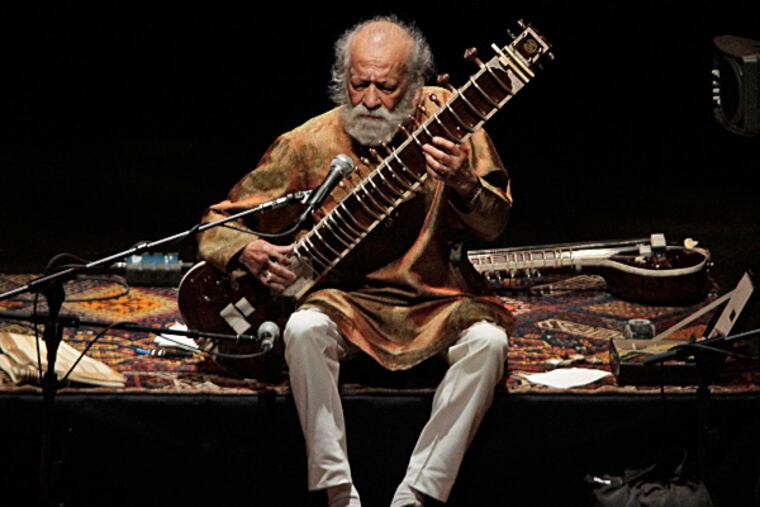Ravi Shankar, sitarist and muse, dies at 92
The Beatles' George Harrison had called him the "godfather of world music."

Ravi Shankar, 92, the sitar player and composer described as the "godfather of world music" by Beatles guitarist George Harrison, has died.
Mr. Shankar, who first performed internationally as a child, devoted his adult life to Indian classical music. His audience widened after Harrison, who introduced the sitar into rock music by playing the instrument on the Beatles' "Norwegian Wood (This Bird Has Flown)," sought out Mr. Shankar's tutelage.
"It's with a very heavy heart that I confirm this sad news," his manager, Earl Blackburn, said in an e-mail Wednesday.
In 1967, Mr. Shankar appeared at the Monterey International Pop Festival, where he was the only artist paid. Two years later, he played at the Woodstock festival. He collaborated with Harrison on the 1971 Concert for Bangladesh, a benefit to help refugees of what was then East Pakistan.
"Ravi laid down the groundwork for other Indian musicians who were later able to perform all around the world because of him," Harrison wrote in the introduction of Raga Mala, Mr. Shankar's 1993 autobiography that the former Beatle edited.
Two daughters with musical careers are among his survivors: Norah Jones, the Grammy Award-winning singer and pianist, from whom he was estranged, and Anoushka Shankar, also a sitarist.
Mr. Shankar composed the scores for Gandhi, Richard Attenborough's Oscar-winning film in 1982, and Satyajit Ray's Apu trilogy, a 1950s series that Time magazine ranked among the 100 best movies ever. He also wrote music for composer Philip Glass, violinist Yehudi Menuhin and French flautist Jean-Pierre Rampal, as well as Harrison.
Rabindra Shankar Chowdhury was born on April 7, 1920, in the northern Indian city of Benares, also known as Varanasi. He was the youngest of seven sons born to Shyam Shankar Chowdhury and his wife Hemangini.
He moved to Paris with his mother in 1930. He had started playing the sitar and other instruments by then, and performed with the family's dance and musical.
As he established himself, he expanded into education. In 1962, he opened the Kinnara School of Music in Mumbai.
Harrison, accompanied by his then-wife Patti, studied with him in India for six weeks in 1966.
Mr. Shankar's popularity led to criticism that he had sold out, and he returned to classical venues after touring with Harrison in 1974. Even so, he said he valued the experience.
"I knew I would be able to present the correct perspective of our music to young people all over the world so that they would have a better understanding of it," he wrote in My Music, My Life, a musical guide and biography that was published in 1968 and updated in 2007.
Mr. Shankar won three Grammys, including one for the Concert for Bangladesh live album and another for West Meets East, a 1967 album with Menuhin. The third was awarded for another concert recording, Full Circle: Carnegie Hall 2000.